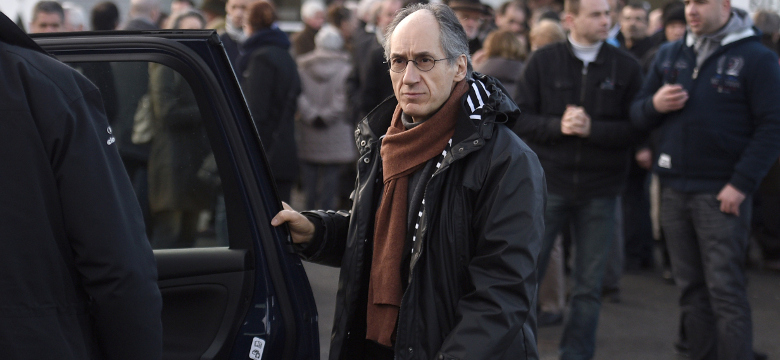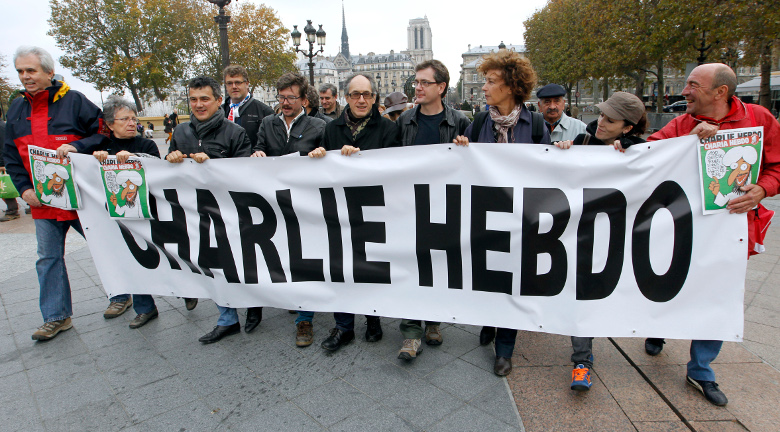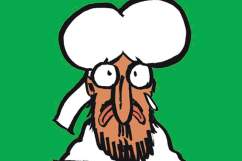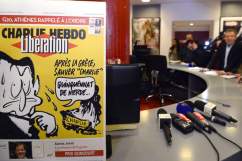
Charlie Hebdo editor-in-chief Gerard Biard. (Getty)
Gerard Biard. editor-in-chief of French publication Charlie Hebdo, is scheduled to headline Sunday’s Meet the Press on NBC.
This will be the editor’s first American network television appearance since two Islamic terrorists attacked the publication’s offices on January 7, killing 12.
Here’s what you need to know about Biard:
1. He Believes Charlie Hebdo Protects Freedom
http://player.theplatform.com/p/2E2eJC/nbcNewsOffsite?guid=x_mtp_charlie_hebdo_pope_150117
Biard, speaking with Meet the Press host Chuck Todd, said that the cartoons in Charlie Hebdo, often caricatures of religious figures, are meant to encourage both freedom of religion and freedom from religion. The full interview will air Sunday on NBC.
According to Biard, lampooning religion is a way of removing it from politics:
“Secularism protects us against this, secularism guarantees democracy and assures peace. Secularism allows all believers and not-believers to live in peace and that is what we defend.”
Biard was responding to comments made by Pope Francis on Thursday, who said, that “in freedom of expression there are limits.”
“One cannot provoke, one cannot insult other people’s faith, one cannot make fun of faith,” the pope said.
2. Biard Was Named Chief After His Predecessor’s Death

Editor Gerard Biard, center, and the surviving staffers of Charlie Hebdo. (Getty)
Among the 12 victims of the terrorist attack on the Charlie Hebdo offices was Biard’s predecessor, Stéphane Charbonnier, who had been editor since 2009.
During a 2012 interview, after the publication’s offices had been firebombed the previous year, Charbonnier was defiant and militant, choosing to continue publishing rather than bow to fear:
“I am not afraid of reprisals, I have no children, no wife, no car, no debt. It might sound a bit pompous, but I’d prefer to die on my feet than to live on my knees.”
Biard, who was named editor shortly following Charbonnier’s murder, is the fourth to hold the title of Charlie Hebdo chief. The three previous editors were François Cavanna, editor from 1969 to 1981, Philippe Val, who took over after a hiatus in 1992, and Chabonnier, who took over in 2009.
3. He Is Outspoken Against Prostitution
In addition to his work as a journalist, Biard is one of three spokesmen for, Zéromacho, an organization intended to bring together “men against prostitution and for equality.”
The organization’s website encourages men to sign a pledge against prostitution:
“We the signatories of this manifesto, men of all ages, origins, professions and social status, refuse to reduce our sexuality to a financial transaction. For us, sexuality is first and foremost a human relationship, lived out within a context of equality and respect for the other person’s freedom and desire.”
In a photo of Biard on Zéromacho’s Twitter profile page, he is holding a sign that says, in French, “Proud not to be a client.” Following the attack on Charlie Hebdo’s offices Zéromacho tweeted that the organization was in “mourning.”
4. Charlie Hebdo Did Not Miss an Issue
A week after 12 people, nine of them employees of the publication — Charbonnier, Jean Cabut, Philippe Honoré, Bernard Verlhac, Georges Wolinski, Bernard Maris, Elsa Cayat, Mustapha Ourrad amd Frédéric Boisseau — Charlie Hebdo, now led by Biard, prepared and published an issue.
“There will be no interruption,” Biard told the BBC the day after the attack.
In fact, though Charlie Hebdo did cease publication for 11 years beginning in 1981, this is not the first time staff has rolled with some significant punches and maintained a publication schedule.
After the publication then known as Hara-Kiri mocked the death of former French leader Charles De Gaulle and was banned, it was renamed Charlie Hebdo and continued publishing.
Years later, after it was reborn in 1992 now with Charbonnier at the helm, its offices were firebombed by Islamic terrorists angry over depictions of the prophet Muhammad. Again, Charlie Hebdo again did not skip an issue.
As Charbonnier said in 2011:
“Freedom to have a good laugh is as important as freedom of speech.”
5. Terrorism in Paris Will Dominate the Sunday TV Lineup
In addition to Biard, Meet the Press will feature White House staffer Dan Pfeiffer and Sen. Lindsey Graham (R), who has criticized the Obama administration’s handling of Muslim detainees.
Beyond Biard, Sunday TV political talk shows will be filled with discussions of the Charlie Hebdo attacks and their implications. For example, the newly named head of the Senate Intelligence Committee, Sen. Richard Burr (R), will appear on CNN’s State of the Union. Burr recently told host George Stephanopoulos that terrorists were engaging in a “war on Western civilization.”
According to Burr:
“When you look around the world, whether it’s in Yemen, whether it’s in Syria, whether it’s in Iraq, whether it’s in Afghanistan or in North Africa with Boko Haram, we’ve got terrorist elements that are carrying out terrorist acts and if you put that collection together, what you’ve got is a war on Western civilization. It really doesn’t matter which terrorist group we insert into the blank.”
On ABC’s This Week, the head of the Europol police agency, Rob Wainwright, is scheduled to discuss what his agency is doing to prevent future attacks.”
British Prime Minister David Cameron will appear on Face the Nation on CBS, to talk about his perceptions of the attack and Sen. Marco Rubio (R), a potential presidential candidate, is expected to criticize the White House for failing to attend a Paris unity rally after the attack attended by many world leaders.


